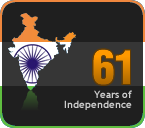
My feelings towards ‘Jodha Akbar’ was bordering on something of a pleasant confusion and a sense of dejectedness stemming out of unquenched expectations as the credits started rolling at the end of the film.
And it was this same feeling which occupied my mind as I made my way back to my home after coming out of the theater. A film which promised to deliver a cinematic spectacle of epic proportions had failed to deliver on its brief but, not without some consolation. The story revolves around the central theme of the blossoming of love between Jalaluddin Akbar and Jodhabai. The backdrop was provided by a mix of conspiracies, betrayals and blood-feuds that are so much part of power equations and empires from time immemorial. Only in this case there were hardly any attempts at intrigue or unpredictability in their unveiling. Akbar is portrayed as the righteous emperor coming to terms with the rigors of ruling a vast empire and facing enemies both within and beyond his dominions. Rajputana being the ‘iron fortress’ of defiance and pride poses the most formidable source of resistance to Mughal expansionist ambitions. As a strategy of alliance and appeasement Akbar marries the young princess of Amer, Jodhabai, to take a section of Rajputs in his confidence. The film tracks the graduation of feelings in Jodha starting from mild repulsion to acceptance and finally to complete submission in the Mughal emperor’s loving embrace. The sequences where little mind-games between the newly wed couple take precedence over the routine of matrimony is both absorbing and amusing. The rich decor and the overwhelming grandeur of the inside of the mahals are breathtakingly beautiful as are the scintillating spread of jewellery and costumes. The detailing of the backdrops merit accolades galore.
Hrithik Roshan as Akbar gives a good solid performance as the charismatic emperor and a passionate lover. He fits the royal-look requisite to the T and one cannot imagine anybody else in those regal robes strolling down the grand corridors of Diwan-e-Aam and Diwan-e-Khas. His delivery of chaste Urdu is flawless most of the times which does its part in lending credibility to the character. It is good if he sticks to do one 'film of substance' at a time for he is good in his role here, exuding a royal nonchalance and a princely swagger to charm his audience.
Aishwarya Rai Bachhan looks every bit the budding flower that Rajput princesses are supposed to have been. Delicate yet resolute. Passionate yet reserved. The sword-fighting scene actually takes the cake for her. She looks genuine in battle-gear though there spreads a shade of blissful serenity on her face when donning the elaborately embroidered ghagras, singing bhajans in front of her private deity.
Ashutosh Gowarikar has kept to the title of the film, devoting the lion’s share of its run-time to the ‘love-story’ amidst the bedlam of treachery and treason cooking in the background. Though one wonders if it was in fact the inspiration borrowed from Jodha’s love that compelled Akbar to ease taxes and regulations on his subjects, in the process coming out a reformed man worthy of a woman’s love and devotion. If history is so twisted to cater to the tastes of the ‘general’ audience and financers I believe there wasn’t enough evidence of ‘creative liberties’ being taken by the talented director in the film. I am sure a racy item-number here and a little outsourcing of certain parts to one Ekta Kapoor and Karan Johar would have done marvels to the prospects of the film at the box-office. With irrelevant songs in “Azeem-o-Shaan....” and “khwaja mere khwaja...” being packed in the most unceremonious manner into Mughal ceremonies one begins to feel for the poor director torn between duty and desire. Though on a personal level I liked the battle sequences which are quite grand compared to anything made before in Indian Cinema it feels just to be miserly when granting points to this film because of its sheer disregard in highlighting the policy and politics of the Akbar-era, the most remarkable aspects of the great reign and the great ruler.
If history has been dumped most listlessly for this film it will soon have some company.


